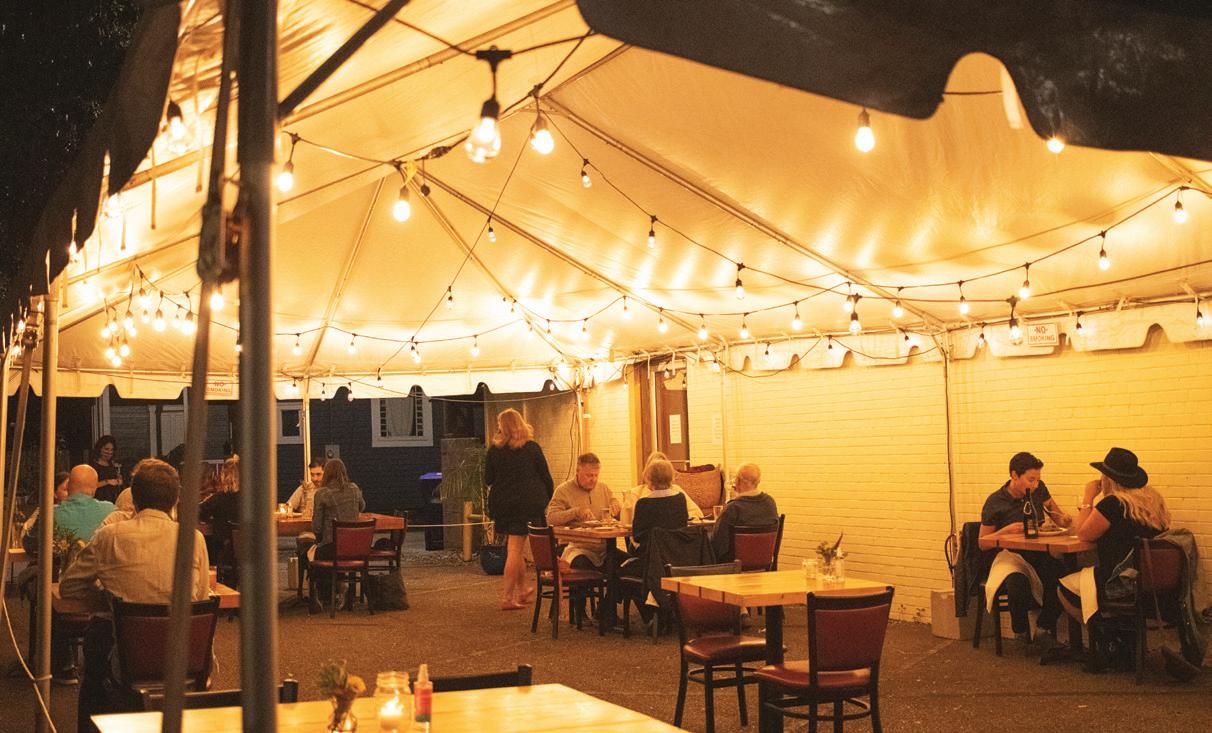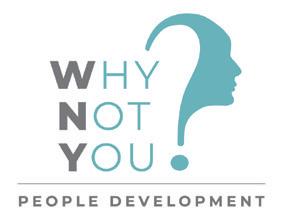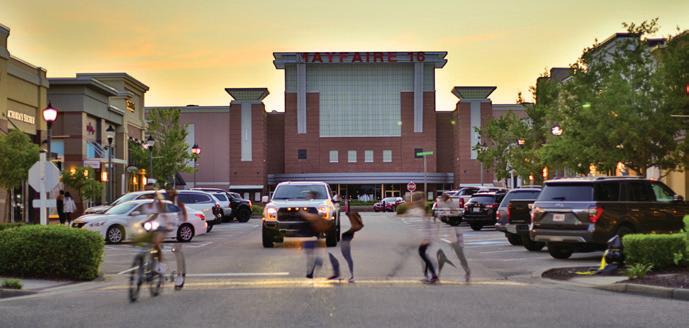
11 minute read
COVID CHANGES
ENDURING TRENDS
SOME CHANGES PROMPTED BY COVID-19 ARE LIKELY TO CONTINUE INTO THE FUTURE
Rx set up a tent to accommodate diners but is now building a permanent outdoor space.
BY JENNY CALLISON PHOTO BY TERAH WILSON OR SOME WILMINGTON BUSINESSES AND ORGANIZATIONS, THE DARK COVID-19 CLOUD IS PROVING TO HAVE A SILVER LINING. They have adopted new practices out of necessity that have shown long-F term benefits. Other companies envision doing business differently just so that dark cloud doesn’t rain on them. Take Rx Restaurant and Bar on Castle Street. With some diners still reluctant to eat indoors, owners James and Sarah Rushing Doss set up a tent on their side parking lot that allowed them to offer outside service to about 30 people at a time. Now they’re creating a permanent outdoor space.
Work began in mid-November on a 20-by-48-foot covered patio that will have a low wall and adjustable shutters to allow fresh air flow but also protection from the wind. The Dosses are installing radiant heat in the flooring so their customers can dine in comfort during chilly months.
“Currently, we’re just focused on the time period ahead, trying to navigate it as
best we can,” Rushing Doss said. “But opportunities seem abundant after COVID: It can be used as event space or for overflow seating. (The outdoor space) is something we never would have considered were it not for the pandemic, but we’re looking forward to having it.”
Because the owners believe that the new covered patio will expand the restaurant’s appeal and capacity, its design will reflect Rx’s interior ambience, Rushing Doss said. Local sculptor Michael Van Hout is creating a moveable installation of wire and tree branches that can function as a space divider as well as decor.
The Dosses have their fingers crossed that the new space will be ready by the end of December so Rx can host a socially distanced, outdoor New Year’s Eve party.
RETAIL REFINEMENTS
Rob Cooley, owner of Apple Annie’s Bake Shop, already had plans to venture into online ordering and shipping when the pandemic hit. The need to serve his customers and find new ones accelerated that effort.
The bakery already had a system for shipping cookies, biscotti and a few other long-shelf-life products to people who called in their orders, but the goal was to set up an online ordering system and to ship fresh frozen cakes, cheesecake and pies anywhere in the country, according to general manager Cora Foley.
“We have everything ready to rock and roll, but we’re still working on our shipping method,” Foley said. “We’ve figured out an icing that tastes delicious but can be frozen and thawed; we worked on the technology for keeping the cakes frozen; we’ve got the boxes. What remains now is the insulation that is the right shape to hold our products and keep them at the right temperature.”
The new online ordering system, installed earlier in the COVID shutdown, has been a boon for locals as well, Foley said.
“The pandemic led to online ordering for in-store pickup,” she added. “Customers could spend less time in the store because their order was already boxed up and already paid for. We also offer curbside pickup except at the holidays, when it’s too busy.”
Knowing that, for retailers, the pandemic meant adapt or die, Cooley said, “We modified our business models as quickly as possible … We will continue all of these in the future and accelerate our use of technology to make the customer experience simple, clear and seamless.”
Small brick-and-mortar retailers were already challenged by online retailers before COVID-19 hit, said Bryce Morrison, senior vice president of Cape Fear Commercial. The pandemic has magnified those difficulties.
“Retailers will have to get creative,” he said. “They are really going to have to focus hard on their services and provide the kind of interaction that’s not available online, like curbside pickup or local delivery. It may mean expanding their product line a little bit and training their employees differently.”
Customers may well expect COVID-era amenities in a postCOVID world, Morrison said, noting that restaurant patrons may want more outdoor dining options or greater space between tables.
“Right now, outdoors is huge. It’s going to be hard to regress to tighter spaces. Even if we do climb out of the pandemic, developers may have to take into account wider sidewalks, more patio space and more green space,” he said. “Of course, this means a retail developer has to acquire more land to allow for that space, and that means more expense for the developer with no income generated from part of that space. So they will need to charge higher rents, a cost that will be passed along to the customer.”
CRUISING INTO THE FUTURE
A similar change is taking place in the travel industry, with airlines and hotels reducing their capacities to enable physical distancing. George Benford, of Travel by Patty Benford, pointed to an industry segment – cruising – that is “making unbelievable changes” as ocean and river cruise lines are beginning to operate again.
“Cruise lines have always been very sanitary, but the measures they are taking now – more ventilation, extra sanitary scrubbings – they are doing everywhere,” he said. “Most ships are going to limit, for now, the number of passengers onboard. There won’t be buffets, or if there are buffets, someone will serve up your order and bring it to your table. They will limit the number of people dining at any one time, and there will be more table separation. They will assign what time you can check in, to avoid long lines. Masks will be required except for eating and drinking. (Shore) excursions will accommodate fewer people. There will be special training for employees.”
Benford believes that cruise lines will maintain these health measures.
“Any change that occurs in this industry, they don’t tend to go back,” he said.
Don’t expect any deals when the travel and hospitality industries open up more fully, Benford warned.
“You are not going to pay the same price as you did before, because there’s more work, the same costs and half the revenue (because of reduced capacity). We’re paying $500 more per person for a cruise we had to postpone to 2022.”
The travel industry may also need to navigate a drop in business travel, even after the pandemic passes. Bill Gates recently predicted that workrelated travel will decline 50% in the post-pandemic world, and the threshold for justifying it will be high.
HOLD THE PHONE
Several local organizations have successfully adapted to virtual communications platforms.
“During the pandemic, our priority focus on the safety and wellbeing of our employees, customers and patients led to a greater reliance on virtual meetings, as we restricted business travel, and on digital and decentralized trial solutions to make it
easier for patients and research sites to participate in clinical trials,” said Ron Garrow, PPD’s executive vice president and chief human resource officer. “This approach has served us well, and our productivity and engagement from our employees has remained very high in our work on behalf of our customers.”
PPD has also adopted innovations and “novel approaches” for its clinical trials at an “accelerated pace,” Garrow added, citing engaging patients digitally, shipping drugs directly to patients, redesigning trials and doing remote screenings via telemedicine.
“We feel confident that these kinds of innovations advanced during the pandemic will continue to be adopted as appropriate once the crisis has passed, supporting the acceleration of research for safe and effective medicines for patients around the world,” he said.
Two Wilmington-based companies are taking a wait-and-see approach to their post-COVID travel and meeting policies.
“As we all deal with the continued effects of COVID-19, we’re not making assumptions about future travel, meetings or otherwise but are monitoring the situation carefully and regularly,” said Natalia Moose, a spokeswoman for nCino. “Our employees will continue to be empowered to make the right decisions for their personal situations while nCino maintains a steadfast focus on customer success, business continuity and employee safety.”
Live Oak Bank, which typically maintains a busy travel schedule nationwide to monitor the progress of its small business borrowers, has not decided what future travel will look like.
“We are constantly assessing our approach to serving Live Oak customers in a safe and responsible way during the pandemic,” said spokeswoman Claire Parker. “Thanks to virtual meeting capabilities, we are able to connect with our customers regularly. Our teams have developed protocols for in-person visits when it is necessary to make a site visit, and we take precautions to ensure the health and wellness of our borrowers and our employees always come first. So far, we have found our procedures to be effective and will continue to monitor our approach as coronavirus impacts ebb and flow across the country.”
MEETING NEEDS
Virtual platforms can mean higher participation. Locally, two conferences hosted by the University of North Carolina Wilmington saw attendance exceed projections, largely because the sessions were held online and attendees could join from home or work. Organizers of this year’s Minority Enterprise Development (MED) Week and the new Gender & Leadership Academy also credited the online format for enabling the gatherings to draw
UNCW’s Outlook conference in October was one of the events the university moved online this year.

PHOTO C/O UNCW participants and speakers from other parts of the country.
Does that mean that UNCW will hold most future meetings and conferences virtually?
“There are many factors which drive the decisions for how meetings and conferences are held, including cost, effectiveness and practicality,” said university Provost James Winebrake. “Many people are tired of online meetings right now, but they undoubtedly have proven their value and effectiveness during COVID and will be used globally in the future. Similar to course delivery decisions, we will strive to have conferences and meetings online when it is appropriate and meets the needs of the specific situations.”
Like Winebrake, Jerry Coleman, director of Cape Fear Community College’s Small Business Center, sees the benefits of in-person, hybrid and fully online options.
“I have always been old school, a face-to-face learner; that’s when the magic tends to happen,” said Coleman. “But in a virtual environment we can make that work as well, and we will continue to offer virtual workshops. We now have the technology to track attendance and participation; as part of a learning institution we have to document participation and make sure people are attending most or all of a presentation.
“We’re doing counseling virtually as well,” he added. “We can do more collaborative counseling virtually, bringing in another partner or subject matter expert and have a joint conference with a client. That allows us to get more done, more efficiently.”
CFCC has taken its counseling and advising services online this year, and that has been really popular, said college spokeswoman Sonya Johnson.
“We may well keep some of these support services online after the pandemic,” she said, adding that online meetings have been well received by staff.
As the coronavirus closed down in-person instruction last spring, CFCC purchased Collaborate software, which Johnson describes as being similar to Zoom but designed for students. And more recently, it bought a light board that allows instructors to make video recordings of their presentations.
“We’ve built an online component into all our classes,” Johnson said. “We want to keep as much hands-on as we can but want to have the choice. The efficiency of online learning is helpful; some of our students already had that preference.”
A large-scale move to virtual learning at UNCW has reaped important benefits in two areas. First, it has expanded the university’s online offerings – a goal Jose Sartarelli articulated when he first became chancellor in July 2015.
“Currently, we have new online programs in various stages of development in all four colleges at UNCW, in areas related to health and human services, natural and physical sciences, education, business and the liberal arts,” Winebrake said, noting that the decision to offer programs online is based on student need and a determination that a virtual platform supports the academic goals of the program.
Second, virtual learning has opened UNCW’s doors even wider to the world.
“One benefit realized very early on in the pandemic was an ability to continue to provide much-wanted international experiences for both the faculty and students, using technology that had quickly become almost ubiquitous,” said Jeremy Dickerson, associate vice chancellor for distance education.
Collaborative efforts between UNCW faculty members and colleagues abroad, said Dickerson, “Lower barriers to international academic experiences and edge us closer to a global experience for all students, and not just those who choose traditional study abroad.”
“WNY People Development provides highly engaging and interactive experiences. We are not "trainers"; we are facilitators of information that guide leaders through the growth and development process utilizing adult learning theory, practical application, data, reflection, LEADERSHIP TRAINING & DEVELOPMENT honest conversations, and fun. We don't provide a "one . Front Line/First Time Leader size fits all" corporate training . Motivating Teams program, because we don't . Confident Leadership believe leadership is "one size fits all". We pride ourselves . Cultural Competence and Inclusion in connecting and inspiring . Managing the Multigenerational Workforce emerging leaders through real and authentic dialogue.

WNY PEOPLE DEVELOPMENT, LLC People Development with Purpose
Wilmington, North Carolina
wnypeopledevelopment.com
910-520-0090
info@wnypeopledevelopment.com
STEFANIE ADAMS, M.ED.
Chief Empowerment Officer

WILMINGTON CLEANING SOLUTIONS






